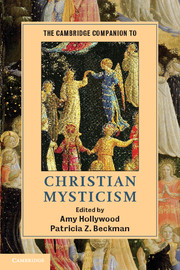Book contents
- Frontmatter
- Contents
- Contributors
- Introduction
- Part I Contexts
- Part II Key Terms
- Part III Contemporary Questions
- 13 Latin and the Vernaculars
- 14 Transmission
- 15 Writing
- 16 The Body and Its Senses
- 17 Mysticism and Visuality
- 18 Emotion
- 19 Authority
- 20 Gender
- 21 Sexuality
- 22 Time and Memory
- Select Bibliography of Christian Mystical Texts up to around 1750
- Select Bibliography of Modern Works Related to the Study of Western Christian Mysticism
- Author and Artist Index
- General Index
- References
14 - Transmission
from Part III - Contemporary Questions
Published online by Cambridge University Press: 05 December 2012
- Frontmatter
- Contents
- Contributors
- Introduction
- Part I Contexts
- Part II Key Terms
- Part III Contemporary Questions
- 13 Latin and the Vernaculars
- 14 Transmission
- 15 Writing
- 16 The Body and Its Senses
- 17 Mysticism and Visuality
- 18 Emotion
- 19 Authority
- 20 Gender
- 21 Sexuality
- 22 Time and Memory
- Select Bibliography of Christian Mystical Texts up to around 1750
- Select Bibliography of Modern Works Related to the Study of Western Christian Mysticism
- Author and Artist Index
- General Index
- References
Summary
In his recent history of Christian mysticism, Bernard McGinn appeals to the model of conversation to characterize a new mysticism emerging during the twelfth and thirteenth centuries. The transmission or manuscript circulation of mystical texts grows out of this conversation. Mystics have visions in which they converse with God, and, obeying his command or that of his priestly agent, they transmit his words to others. For example, Hildegard of Bingen (1098–1179) opens her Scivias (short for Scito Vias Domini [Know the Ways of God]) with a declaration in which she reports a voice from heaven telling her to “speak therefore of these wonders, and being so taught, write them and speak.” Hildegard’s contemporary, Elisabeth of Schönau (1129–64), was also graced with visions that a guiding angel explained to her and that her brother Ekbert recorded in a series of books. Ekbert reports that Elisabeth was “compelled by familial love and by order of the abbot to explain in intimate detail the whole thing to this cleric.” A century later, at the beginning of Mechthild of Magdeburg’s (ca. 1210–82) The Flowing Light of the Godhead, God is quoted as saying: “This book I hereby send as a messenger to all religious people, both the bad and the good.” Later in the book, Mechthild refers to her confessor having commanded her to write. Finally, Henry Suso (1295–1366) received a divine command to share his mystical path. In the preface to his “Life,” he reports that a nun in his spiritual care (Elsbeth Stagel, d. ca. 1360) had begun composing it without his knowledge. When he discovered this “theft,” he reproached her and burned the pages she had with her, but when about to burn a second batch of pages, “this was hindered by a celestial message from God which prevented it.”
- Type
- Chapter
- Information
- The Cambridge Companion to Christian Mysticism , pp. 240 - 251Publisher: Cambridge University PressPrint publication year: 2012
References
- 1
- Cited by



